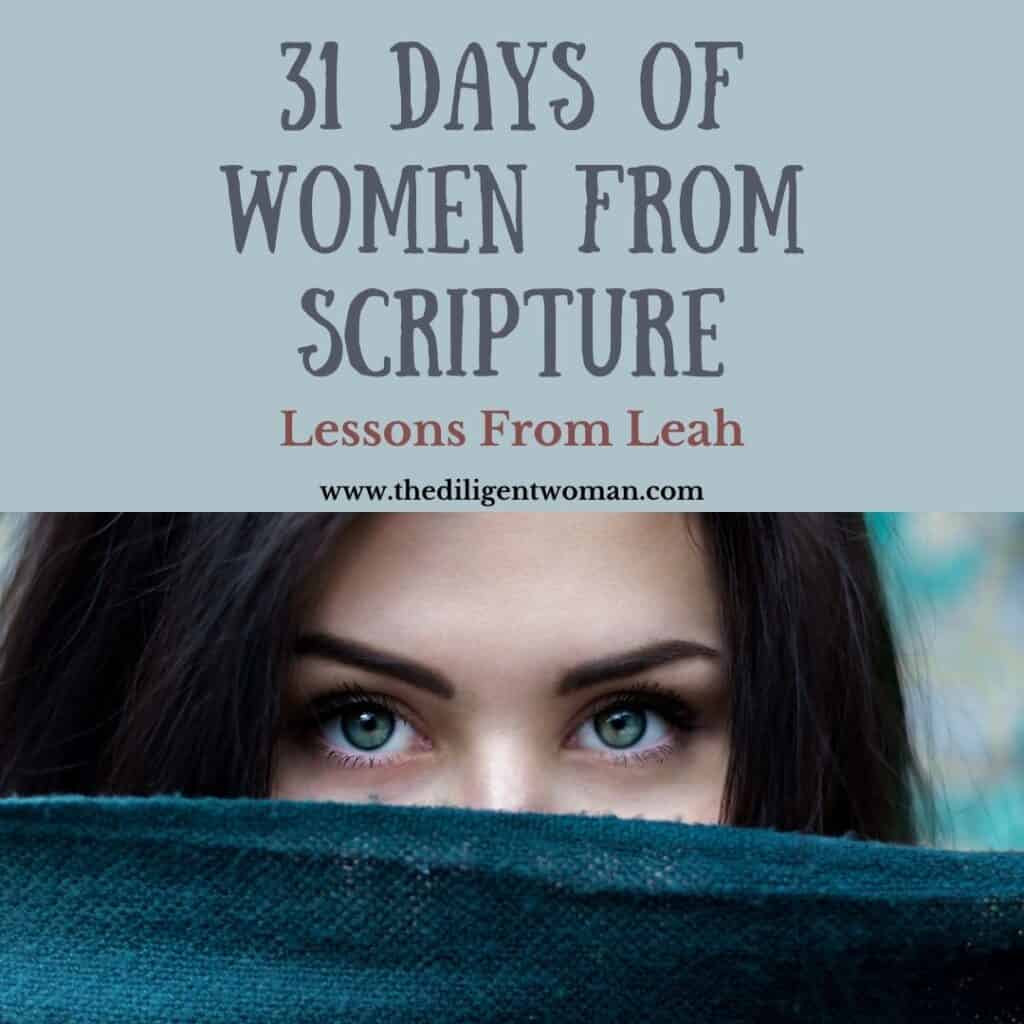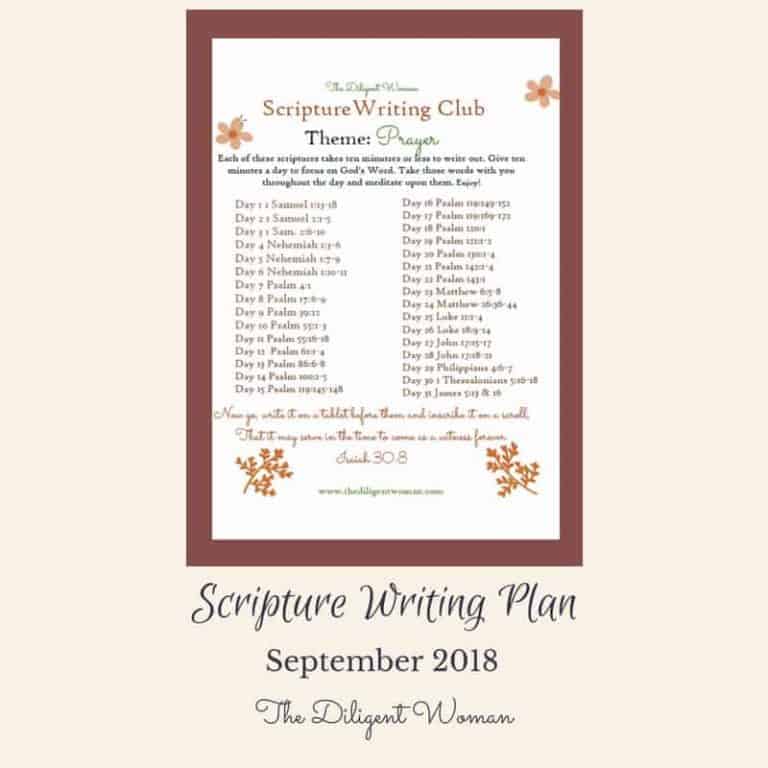Lessons from Leah
31 Days of Women from Scripture
Day Five
Lessons from Leah
Our woman today is Leah. Her story is in the same readings as Rachel’s Genesis 29 – 31; Genesis 33; Genesis 35; and Ruth 4:11.
This is part two of a two-part lesson. Rachel‘s and Leah’s stories run right along each other. I will not retell the story today, you can get the full background by reading Rachel‘s side of things. Today, we will look at Leah’s side.
Our first introduction to Leah is in Genesis 29:17, “And Leah’s eyes were weak, but Rachel was beautiful of form and face.” We do not know what “weak” means here. The New King James uses “delicate”; the King James Version says “tender eyed”. The New Living Translation and HCSB do not translate the word, but instead try to indicate what they thought it meant by saying her eyes “had no sparkle” (NLT) and were “ordinary” (HCSB). As she is contrasted to Rachel’s physical features, I do not think it was only that Leah had poor eye-sight. Her name, “Leah”, means “weary”, so I always think that she looked tired or depressed. The eyes are often reflective of our well-being (1 Sam. 14:27-30; 1 Kings 14:4) and our character (Ps. 131:1; Prov. 6:17; Prov. 21:4). There were clear renderings for those whose eyesight had weakened in such a way as to not see well (Gen. 27:1; 1 Sam. 3:2). David was said to have “beautiful eyes” in 1 Samuel 16:12. And the Shulamite woman is seen by both Solomon and the Shepherd as having “dove’s eyes”, which seems to be associated with being steady and peaceful (Song of Solomon 1:15; Solomon.4.1). The description of Leah’s eyes match none of these. So whatever her “weakness” was we are left to wonder. Regardless, we know Jacob was not drawn towards Leah.
As I mentioned yesterday, my heart just aches for Leah when I read this story! Even with the traditions of the time, I cannot imagine that this is how she envisioned her married life. Her brother “sells” her get more work from Jacob (Gen. 31:14-16). Her needs were not what was under consideration (Gen. 29:26-27).
God sees that Leah was not loved by Jacob (Gen. 29:31) so He opened her womb to conceive.
As a side note – this is not the only place that this concept is taught, but this verse (and the whole story really) makes it clear that sex does not equal love. Physical intimacy within a rightful marriage is beautiful and a reflection of the phileo and agape love that should exist between spouses while also providing for the eros type of love. There are other behaviors from a spouse; tenderness, kindness, selflessness, etc that indicate that the physical relationship is loving. Just having the physical relationship alone, outside of a marriage that fits Genesis 2:23-24 does not mean you have someone’s love. Young people (and older people) need to not fall into that lie that Satan plants! But that’s a whole other lesson.
Leah’s side of this story is the emotional one. We have more insight into her thinking via the naming of her children.
Her firstborn is named Reuben, “for she said, ‘Because the Lord has seen my affliction; surely now my husband will love me'” (Gen. 29:32). Reuben means “behold, a son”. Leah had achieved what every married woman sought – to give her husband a firstborn son. She hopes that having achieved this will bring Jacob’s attention around to her. The second son is Simeon, “because the Lord has heard that I am unloved” (Gen. 29:33). Simeon means “heard”. The third son is named Levi. Levi means “joined to”, so she says, “Now this time my husband will become attached to me” (Gen. 29:34). Can you feel her desperation? This is three sons – so at the very least this has been three YEARS of her life. The hope that she holds out, the longing she feels to be Jacob’s true wife. It just hurts me to read it! She then has the fourth son. She changes her focus, “This time I will praise the Lord” (Gen. 29:35); Judah means “praised”.
None of Leah’s thoughts seem to be focused upon Rachel at this point. Which contrasts with Rachel highly (Gen. 30:1, Gen.30.3-8). Leah’s focus is upon Jacob. But then Rachel makes it a personal competition between herself and Leah. When Bilhah gives two sons to Rachel, Leah decides to follow suit and give her maid Zilpah to Jacob as wife. Zilpah bears a son and Leah names him Gad, which means “a troop cometh” or “how fortunate” (Gen. 30:11). So she obviously thought this was a good thing. Zilpah bears another son and Leah names him Asher, meaning “happy”. She says, “Happy am I! For women will call me happy” (Gen.30:13). Leah thinks that other women will hold her up because of this sixth son.
During the wheat harvest, Leah’s son Reuben goes looking for mandrakes in the field. He brings them to Leah. Rachel sees them and asks that Leah share with her. Leah refuses saying, “Is it a small matter for you to take my husband? And would you take my son’s mandrakes also?” To my mind this could be two things: 1. It did not matter that Jacob had wanted to marry Rachel first. He WAS married to Leah first. To Leah’s mind, Rachel was the stealing Jacob from Leah. Or 2. Leah plays on Rachel’s desires and uses the mandrakes to get what Leah wants (there is that echo of Jacob and Esau over the stew (Gen. 25:27-34). Either way – it was not nice. Rachel decides she’d prefer the mandrakes, so she sells her husband’s physical attentions for MANDRAKES. Leah ACCEPTS the offer! She meets Jacob when he comes home that night and informs him that she has hired him to be in her bed that night (Gen. 30:16).
When she conceives again, somehow Leah reasons that this is her just payment for having given up her maid to her husband. She names this son, Issachar – “there is recompense” (Gen. 30:18). Leah conceives again and this son she names Zebulun (“exalted”). Genesis 30:20 says “Then Leah said, ‘God has endowed me with a good gift; now my husband will dwell with me, because I have borne him six sons.'” She believes this is it – Jacob will choose to live with her and not just be an occasional visitor. There is nothing to indicate that she got her wish. She conceives again, this time giving Jacob a daughter. She names her “Dinah” which means “judgment”.
God remembers Rachel and she is able to finally give a son to Jacob herself – he is Joseph. Despite all of Leah’s thoughts about what providing seven (nine if you count Zilpah’s sons) children to Jacob would bring for her – we see Jacob is still focused upon Rachel because he favors Joseph, and later Benjamin, over the other sons (Gen. 37:3; Gen. 44:20).
After all of this, God tells Jacob it is time to go home. Rachel and Leah both recognize that Laban has used all of them wrongly (Gen.31:14-16) and Jacob is right to leave.
When Jacob and all his company finally get close to home. We can still see Rachel’s preference by Jacob. He sees Esau coming with four hundred men, so he divides everyone into groups (Gen. 32:7-8; Gen.33.1-3). He puts Bilhah and Zilpah, and their children, in front. Leah and her children come next, and Rachel and Joseph are last. There is a loving reunion between the brothers and Jacob settles once again among family.
We read in Genesis 30:13 where Leah expressed that women would call her “happy” after the birth of Asher. She was right on that point. In Ruth 4:11, we see the legacy of Leah – “All the people who were in the court, and the elders, said, ‘We are witnesses. May the Lord make the woman who is coming into your home like Rachel and Leah, both of whom built the house of Israel…'” The promise of a great nation was fulfilled and Leah bore more of those sons than Rachel did. But we know from other scripture that their feuding was not part of His will.
1 Corinthians 7:1-7 teaches us that physical intimacy is something that should be regarded as “due” to the other spouse. It is not a box on a checklist. It is something that a husband has every right to expect to receive from his wife, and she has every right to expect to receive from him. The only time sexual relations are to be halted is through “agreement for a time”. Leah’s expectations were all RIGHT. It was unfortunate for her that her circumstances were not setup the way that God intended. Jesus makes it clear that God’s plan, from the beginning was a marriage that only included two people – one man, one woman (Matt. 19:8). It was the “hardness of heart” of men that allowed for deviation from that thought. We see that with Sarah. She brought in Hagar because she failed to trust God to keep the promise He had made to her. Laban met his own ends by secretly marrying Leah to Jacob and then allowing Rachel to be married to him as well. Every time we see marriage to more than one woman at a time in scripture, the situation is presented negatively. That relationship was meant to be special. The feelings that Leah and Rachel dealt with were natural because they were living in unnatural circumstances.
Rachel and Leah stand as examples of situations NOT to get into. Be very protective of the marriage relationship. That protection starts long before you are actually married. Keep yourself pure. If the man you are interested in cannot leave other women alone – do not marry him. He should belong ONLY to you. The same goes for men looking for women to marry. If she loves the attention of other men, he should not marry her. That physical intimacy only has a rightful place within a rightful marriage. Each spouse should be free to enjoy it without the baggage and stress that comes with bringing in other people to the mix. Any interaction with another person that causes your spouse to doubt your fidelity is a wound you inflict by YOUR own choices. You may say that they should just trust you – yes, they should begin with trusting you. But you also should NEVER give them reason to STOP trusting you. Jesus says in Matthew 5:37, “But let your statement be, ‘Yes, yes’ or ‘No, no’; anything beyond these is of evil.” You should not need to say, “honey, believe me, I have never done…” Your word should be so known to be truthful that a simple, “No, I have not done that.” is enough to restore trust. But that must be backed up by behavior that also reflects “yes, yes” and “no, no” – aka meaning that you do what you say, and you say what you do. Hypocrisy and lying will not grant you trust within in relationship.
So, what do we take from these women? Find the GOOD in them and imitate it. Notice the WRONG in each one and avoid it! Go back to James 4:7, “Therefore submit to God. Resist the devil and he will flee from you.” Life is making choices – choose to dwell on the good things and glorify God. 1 Timothy 4:16 says, “Take heed to yourself and to the doctrine. Continue in them, for in doing this you will save both yourself and those who hear you.” Your beauty, your past good behavior, your abundance compared to others’ lack is something in which you should never put your faith and trust.
As was mentioned in the lesson on Sarah, freedom is found in Christ. God will hold you up when situations are difficult if you lean and trust on Him. “Offer the sacrifices of righteousness, And trust in the Lord.” Psalm 4:5
Enjoy!
PS – This is a great post with reminders of how to avoid things today that could damage your marriage. Check it out! 8 of the Worst Marriage Habits
PS – An interesting tidbit – It was not until the 6th generation after Adam, Lamech, that scripture indicates a man “taking for himself” two wives. I need to study it more, but I could not find another indication of it until Abram’s father, Terah is said to have had two wives (Gen. 20:12). We do not know that he had those wives at the same time. Abram is ten years older than Sarai, it is just as possible that Terah’s first wife died and he married another. Terah is many generations beyond Lamech. Noah and his sons all had one wife as revealed by God. From what I can tell, it took over a thousand years before multiple wives was the norm – at least in the lineage of God’s people. It was not something that originated with God.



